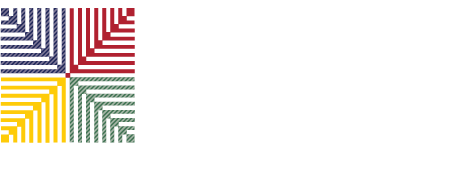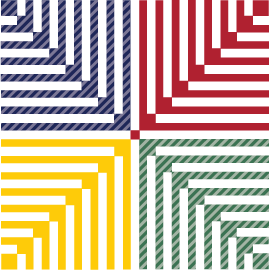

BPFF: Where and when did you first learn the art of Palestinian embroidery? Who taught it to you?
CA: I was 10 or 11 years old and living in Zarqa, Jordan at the time. I was enrolled in a parochial school where the nuns taught us embroidery as part of the curriculum. My mother was also instrumental in enforcing the skills needed.
BPFF: What role did embroidery play in the lives of young Palestinian women at that time? How was it woven into daily life?
CA: Embroidery was a way of life socially and economically. For the peasant community, the girls and women would embroider for their own clothes because they could not afford buying them. Also, some of the girls and women would be hired to embroider pieces for others who couldn’t do it themselves or afford paying for it.
Each region in Palestine has distinctive designs and colors that are used in the embroidered pieces. Especially for the bodice pieces on the thobes (traditional dresses). The story of our last name for instance, goes like this: A great-grandfather of my husband’s married a woman from the town of Aboud, and when the villagers saw her on the street, they would yell, “There goes the Aboudia! (the woman from Aboud),” which they identified by the special embroidered pattern on her thobe. Hence the name Abudi!
BPFF: How, when, and why did your family leave Palestine?
CA: We lived in Jerusalem prior to 1948. When the war started, we escaped to Zarqa, Jordan. I was four years old at that time. We were lucky to be able to rent a place. Many others were not so lucky and ended up in refugee camps and many are still there almost 70 years later.
Later in life, I married a man (Khalil) from the village of ’Ain ’Arik near Ramallah, in the West Bank. We left there for Kuwait in the early 1960s for a better life, but continued to go back every summer to visit my mother in-law. After 1967, however, we were unable to visit easily. But then again after the 1993 accords, we started going back every few years to visit.
BPFF: What did that upheaval do to your ability and desire to embroider?
CA: In particular after the 1967 war, it became more pressing to preserve the tradition as to ensure that the identity of Palestinians is preserved. When people escape their homes during wars, they leave behind all their possessions and they lose their homes, but their memories and skills are preserved with them.
Palestinian embroidery is a unique tradition that has been around for many centuries. There is even evidence that some of the patterns go back to 1200 BC. This became more important to me to help keep my identity alive, especially after escaping yet another war in 1990 and migrating to the United States.


CA: A lot of the designs have links to the various villages and town in Palestine. The bodice pieces define the origins of the women who wear them. Also, some of the small pieces have significance to the lifestyle in Palestine, whether it signifies a type of tree or animal and of course, after the Nakba (Catastrophe), the key.
BPFF: What does it mean to you to embroider? How does it help define who you are?
CA: The act of embroidery is something that is enjoyable to me. It has a calming effect. I also do it to help preserve the Palestinian identity and to help preserve the tradition for future generations. I remember when I got married, I would sit with the neighborhood women at dusk and we collectively would work on our embroidery pieces and enjoy each other’s company and discussions as we listened to the kids play in the background. The view of the sun setting in the valley was mesmerizing. I can’t help but smile inside even now as I recollect those past days.
BPFF: Why do you continue to embroider?
CA: Because this is part of my identity and I want to pass all my work to my children and their children to help them understand where we came from and preserve their heritage. We lost our home and our land, but this is something that we can never lose and it cannot be taken away from us!
BPFF: What piece of embroidery that you have completed is most meaningful to you and why?
CA: My favorite and most meaningful piece is the one I did from 2001 to 2003. I have added the names of some of the villages that were wiped from existence after the Nakba, as well as ones that still exist.
BPFF: What inspired you to create a unique, hand-embroidered banner for the Boston Palestine Film Festival?
CA: When my son sent me the BPFF logo image last year, we discussed doing it in embroidery, to reflect the Palestinian way of life. And one thing led to another and the creation took on a life of its own!
BPFF: How did you design the BPFF banner?
CA: Of course a major component of the design is the BPFF logo itself, but my husband (Khalil) helped by creating a printout of each part of the banner with the cloth design to help in creating the right proportions. And once the logo part was done, I embellished the entire banner around it with other patterns as well. [Editor’s note: The image shows just a small detail of the banner, which is about four feet wide. The banner will be unveiled at the exhibit on Oct. 28.]
BPFF: How long did it take to hand-stitch the BPFF banner?
CA: The banner took me a full seven months to make, from 11/2/2017 to 6/4/2017.
BPFF: What do you want to share about the Palestinian people?
CA: I want people to be aware that we as a population have the same aspirations, dreams, hopes, and sorrows that every other group of people around the world has. Sometimes this simple concept is lost in the midst of conflict and controversy. I hope that my embroidery and the exhibit will bring some understanding to others about the long and rich heritage and traditions of the Palestinian people.
We are richer as a society when we learn about other cultures and traditions and experience some of those traditions ourselves.
BPFF: And finally, what is your fondest memory of Palestine?
CA: When I used to visit Palestine with my family after escaping Jerusalem in 1948 and we would visit Jerusalem, Ramallah, ’Ain ’Arik and hike the mountains. I love ’Ain ’Arik, and it still lives in me.
Abudi’s extensive collection of hand-stitched embroidery will be on exhibit during Seamingly a PastTime:How Embroidery Preserves Narrative and Culture Through Time, which takes place Saturday, October 28, 2017 at the Center for Arts at the Armory at 6 pm. Tickets $15 online; @20/door. Mezze Buffet included.
Our Closing Film, Stitching Palestine by Carol Mansour, profiles 12 Palestinian women who are linked by the thread of embroidery. Stitching Palestine screens on Sunday, October 29, 2017 at the Museum of Fine Arts, Boston at 3:00p and is co-presented with ANERA.
View the full festival schedule here.


